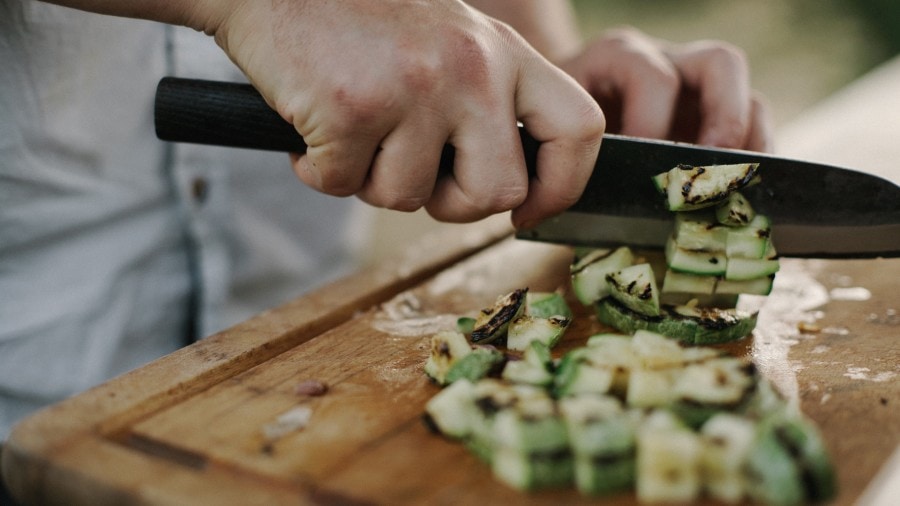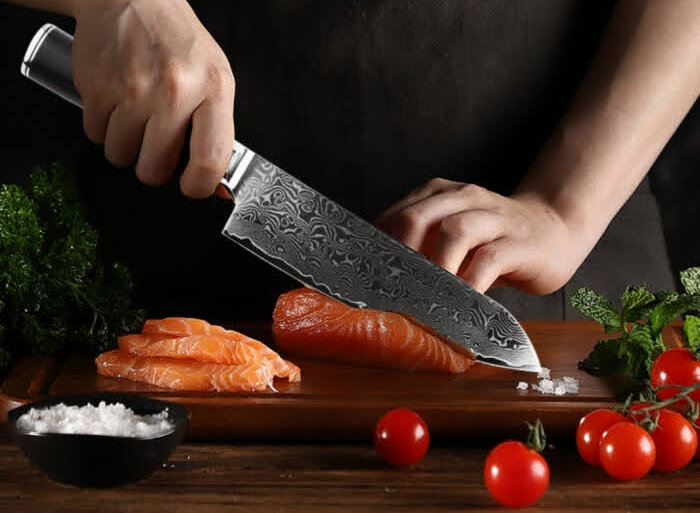In the pursuit of culinary mastery, the right tools can elevate your cooking experience significantly. Among both professional chefs and passionate home cooks, Damascus knives stand out for their ability to deliver fine, precise slices. With a captivating history that matches their stunning design, these knives are prized not only for their striking aesthetics but also for their exceptional functionality.
What sets Damascus knives apart in professional kitchens is their unparalleled precision in slicing. Achieving fine slices is more than just cutting; it involves preserving the texture, flavor, and visual appeal of the ingredients. Thanks to their rich tradition and exquisite craftsmanship, Damascus knives excel in this regard.

The Intriguing History of Damascus Knives
The tale of Damascus steel and its knives is as intricate and layered as the beautiful patterns found on their blades. Named after the historic capital of Syria, Damascus steel is believed to have originated there, and its lore adds an air of mystique to its legacy. Known for their mesmerizing, water-like patterns, these knives are as functional as they are artisticthey represent the many layers of skill that go into their creation.
For those curious about the rich background of these knives, a deeper exploration can uncover priceless insights [here](https://www.shieldon.net/the-history-of-damascus-steel-and-folding-knives/). These charming patterns enhance not only the knife's edge but also its longevity and sharpness, making each Damascus knife a unique work of art.
Why Chefs Choose Damascus Knives for Precision Slicing
The appeal of Damascus knives goes beyond their visual allure. The steel utilized in crafting these knives boasts an impressive strength-to-hardness ratio, which is essential for achieving razor-sharp edges. This superior quality enables chefs to undertake tasks that require meticulous precision, such as slicing sushi, cutting delicate herbs, or crafting elaborate garnishes.
Moreover, the microstructure of the steel and the detailed forging process enhance the sharpness and durability of the knifes edge. For a more in-depth look at the science behind Damascus steel, check out [HowStuffWorks](https://science.howstuffworks.com/damascus-steel.htm).
The Distinct Features of Damascus Knives
The significance of a knife's balance and weight cannot be overstated in professional settings. Often, Damascus knives are ergonomically designed to minimize fatigue and improve control during extended use. This balance is especially important when executing long, clean cuts that yield beautifully transparent slices of food.
Another standout characteristic of these knives is their exceptional edge retention. A sharp edge requires less frequent honing, which helps maintain the knife's integrity over time and ensures that fine slicing becomes a consistent practice.
How to Care for Your Damascus Knife
While Damascus knives are robust, they still require proper care to retain both their functionality and beauty. Regular honing and safe storage are essential to prevent blade damage. Its best to use a soft brush for cleaning, steering clear of harsh scrubbing that might mar the intricate designs on the blade.
Embracing proper maintenance goes hand in hand with valuing this exquisite art form. With the right care, you can extend the lifespan of your knife, ensuring it remains as effective and appealing as the day you brought it home.
Recognizing Damascus Knives Beyond the Culinary World
Although primarily celebrated for their culinary applications, Damascus knives also possess rich historical and cultural significance. They were historically cherished as gifts and heirlooms. In contemporary times, they serve as coveted collector's items, often passed down through generations, symbolizing a fusion of craftsmanship and utility.
For a broader understanding of their cultural importance, explore more [Swords of Northshire](https://www.swordsofnorthshire.com/blogs/theblade/the-history-of-damascus-steel).

FAQs
What is the primary advantage of using a Damascus knife for slicing?
Damascus knives are known for their superior cutting edge, facilitating easy, thin, and precise slicing compared to traditional knives.
How should I maintain my Damascus knife?
Regular honing, gentle cleaning with a soft brush, and proper storage are vital for maintaining both the edge and appearance of a Damascus knife.
Are Damascus knives suitable for everyday cooking tasks?
Absolutely! Their durability and sharpness make them ideal for both daily cooking and specialized slicing purposes.
You can find more affordable options, including Damascus knives under $200, as well as lightweight choices like the lightweight Damascus kitchen knife that suits different preferences.
For those considering a new addition to their collection, the 8-inch Damascus chef knife is an excellent choice, or explore the versatility of the Damascus steel chef knife for everyday use. If you're curious about brands, check out if Nedfoss is a good knife brand.
This article contains affiliate links. We may earn a commission at no extra cost to you.


























